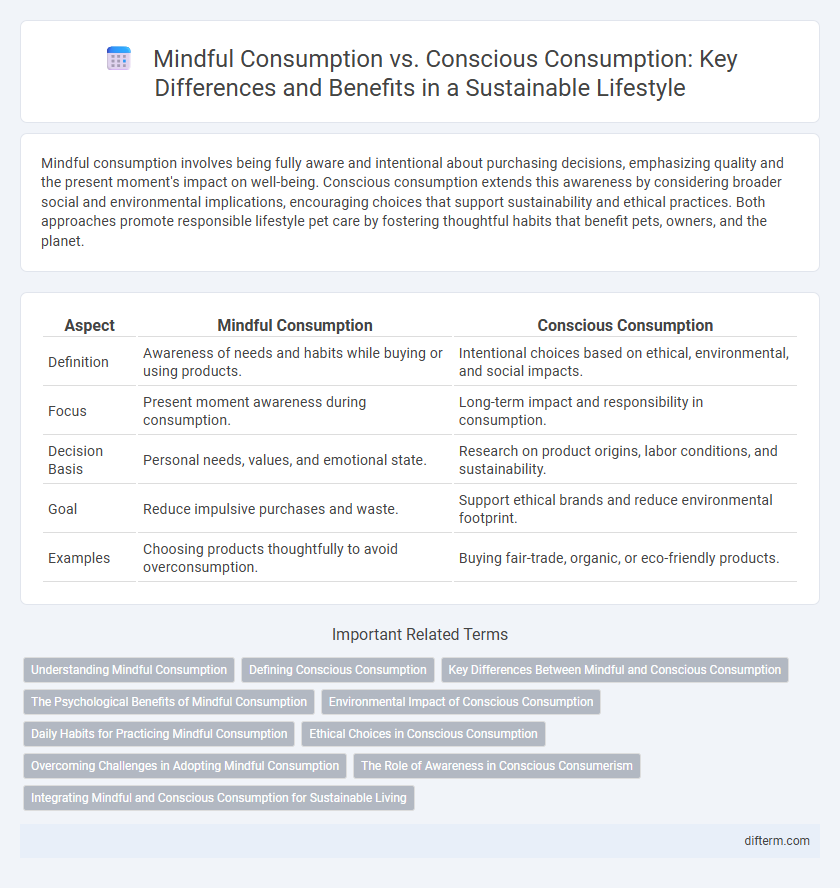Mindful consumption involves being fully aware and intentional about purchasing decisions, emphasizing quality and the present moment's impact on well-being. Conscious consumption extends this awareness by considering broader social and environmental implications, encouraging choices that support sustainability and ethical practices. Both approaches promote responsible lifestyle pet care by fostering thoughtful habits that benefit pets, owners, and the planet.
Table of Comparison
| Aspect | Mindful Consumption | Conscious Consumption |
|---|---|---|
| Definition | Awareness of needs and habits while buying or using products. | Intentional choices based on ethical, environmental, and social impacts. |
| Focus | Present moment awareness during consumption. | Long-term impact and responsibility in consumption. |
| Decision Basis | Personal needs, values, and emotional state. | Research on product origins, labor conditions, and sustainability. |
| Goal | Reduce impulsive purchases and waste. | Support ethical brands and reduce environmental footprint. |
| Examples | Choosing products thoughtfully to avoid overconsumption. | Buying fair-trade, organic, or eco-friendly products. |
Understanding Mindful Consumption
Mindful consumption involves a deep awareness of the present moment during purchasing decisions, emphasizing the impact on personal well-being and the environment. It encourages intentional choices that reduce waste, promote sustainability, and align with individual values without impulsive behavior. This practice fosters a balanced relationship between needs and desires, enhancing overall life satisfaction and environmental responsibility.
Defining Conscious Consumption
Conscious consumption emphasizes awareness of the environmental, social, and ethical impacts of purchasing decisions, encouraging individuals to choose products that support sustainability and fair labor practices. It involves evaluating the lifecycle of goods, from production to disposal, to minimize harm and promote positive change. This approach fosters responsibility by prioritizing transparency, durability, and the reduction of waste in everyday consumption habits.
Key Differences Between Mindful and Conscious Consumption
Mindful consumption centers on being fully present and aware of each purchasing decision, emphasizing the quality and impact of products on personal well-being. Conscious consumption extends beyond individual choices to consider broader social, environmental, and ethical implications, fostering responsibility toward community and planet. Key differences lie in mindful consumption's focus on awareness and intention, whereas conscious consumption integrates ethical values and global sustainability practices.
The Psychological Benefits of Mindful Consumption
Mindful consumption enhances psychological well-being by fostering present-moment awareness and reducing impulsive buying behaviors, which leads to greater satisfaction with purchases. This practice promotes emotional regulation and decreases anxiety linked to consumer culture, supporting mental clarity and intentional living. Studies highlight that individuals who engage in mindful consumption experience improved self-control and a stronger sense of purpose in their lifestyle choices.
Environmental Impact of Conscious Consumption
Conscious consumption emphasizes reducing environmental footprints by prioritizing eco-friendly products, sustainable sourcing, and ethical manufacturing processes. It encourages consumers to evaluate the lifecycle of goods, minimize waste, and support businesses committed to green practices. This approach significantly lowers carbon emissions, conserves natural resources, and fosters biodiversity preservation compared to traditional or mindless consumption habits.
Daily Habits for Practicing Mindful Consumption
Daily habits for practicing mindful consumption include pausing before purchases to assess genuine needs and impacts, promoting intentional spending aligned with personal values. Incorporating practices such as maintaining a gratitude journal and reducing impulse buying cultivates awareness of consumption patterns and reduces waste. Prioritizing quality over quantity in everyday choices fosters sustainability and supports mental well-being.
Ethical Choices in Conscious Consumption
Conscious consumption involves making ethical choices by prioritizing products that support fair labor practices, sustainable sourcing, and environmental stewardship. Consumers engaging in conscious buying actively seek transparency from brands regarding their supply chains and production methods. This ethical approach reduces harm to communities and ecosystems while fostering a market shift towards responsible corporate behavior.
Overcoming Challenges in Adopting Mindful Consumption
Overcoming challenges in adopting mindful consumption involves developing consistent self-awareness and resisting impulsive buying habits driven by social pressures or marketing tactics. Consumers can enhance their mindful consumption practices by prioritizing purposeful purchases that align with personal values and environmental sustainability. Building supportive communities and utilizing mindful consumption tools, such as budgeting apps or reflective journaling, facilitates long-term behavioral change.
The Role of Awareness in Conscious Consumerism
Awareness plays a crucial role in conscious consumerism by enabling individuals to evaluate the environmental, social, and ethical impacts of their purchases. Unlike mindful consumption, which emphasizes present-moment attention during buying, conscious consumerism demands a deeper understanding of product origins, company practices, and long-term consequences. This informed awareness drives responsible choices that support sustainability and social equity across global supply chains.
Integrating Mindful and Conscious Consumption for Sustainable Living
Integrating mindful and conscious consumption fosters sustainable living by encouraging deliberate choices that minimize environmental impact and promote ethical practices. Mindful consumption emphasizes awareness and intention during purchasing, while conscious consumption incorporates broader social and ecological considerations into decision-making. Combining these approaches cultivates a lifestyle that supports resource conservation, reduces waste, and upholds social responsibility.
mindful consumption vs conscious consumption Infographic

 difterm.com
difterm.com